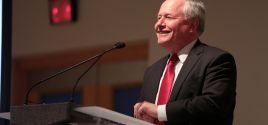Miller: Abramoff Money Halted Sweat Shop LegislationKTVUJan. 04, 2006 |
Popular 
Bill Kristol: My Fellow White Americans Are 'The Enemy'

Biden's Lebanon Envoy, Ex-Israeli Soldier Amos Hochstein, Gave Israel 'Green Light' to Invade Lebanon

Israel Detains American Journalist for Reporting on Damage from Iran's Strikes [UPDATE]

Journalist Jeremy Loffredo Released After Four Days in Israeli Detention, Ordered Not to Leave

WATCH: New Film 'Atrocity Inc' Exposes How Israel Lied About October 7th to Justify Genocide
 UNDATED -- East Bay Congressman George Miller just couldn't understand why his legislation to end sex and textile sweat shops in the Northern Mariana Islands -- a U.S. protectorate in the Pacific -- was being blocked in the House of Representatives. Now, he has his answer. Miller had run into a roadblock allegedly thrown up by lobbyist Jack Abramoff. "There is no question that Jack Abramoff is no run-of-the-mill lobbyist," Miller said on Mornings on 2. "The Mariana Islands were one of Abramoff's clients…The garment industry there was importing young men from China and elsewhere work in sweat shops…There's a sex trade…labor camps." "I was trying to get legislation passed in the House," Miller added. "It passed out of committee in the Senate and had bi-partisan support. I just couldn't get it to the floor of the House of Representatives." Miller said it was time to investigate why the legislation was being blocked. Meanwhile, President Bush, former House Majority Leader Tom DeLay and his successor Roy Blunt on Wednesday joined the list of officials shedding political donations from Jack Abramoff, the once- powerful lobbyist who has agreed to testify in a political corruption investigation. Bush's re-election campaign is giving up $6,000 in campaign contributions connected to Abramoff, who pleaded guilty Tuesday to fraud, corruption and tax evasion in Washington. On Wednesday in Florida, he pleaded guilty to conspiracy and wire fraud charges stemming from his 2000 purchase of a gambling boat fleet called SunCruz. Abramoff has agreed to tell the FBI about alleged bribes to lawmakers and their aides on issues ranging from Internet gambling to wireless phone service in the House. The full extent of the investigation is not yet known, but Justice Department officials said they intended to make use of the trove of e-mails and other material in Abramoff's possession as part of a probe that is believed to be focusing on as many as 20 members of Congress and aides. "The corruption scheme with Mr. Abramoff is very extensive and we will continue to follow it wherever it leads," said Assistant Attorney General Alice Fisher, head of the Justice Department's criminal division. Bush, DeLay, Blunt and Rep. Bob Ney joined House Speaker Dennis Hastert in announcing plans to either return campaign contributions from Abramoff or give them to charity. Several others announced in December that they were giving back Abramoff's donations to their campaigns. Abramoff raised at least $100,000 for the Bush-Cheney '04 re-election campaign, earning the honorary title "pioneer" from the campaign. But the campaign is giving up only $6,000 that came directly from Abramoff, his wife and one of the Indian tribes that he worked to win influence for in Washington. The money is being donated to the American Heart Association. Abramoff, his wife and the Saginaw Chippewa Indian Tribe of Michigan each donated $2,000 to the Bush campaign, said Republican National Committee spokeswoman Tracey Schmitt. The rest of the money that Abramoff brought in was from other people whom he encouraged to donate to Bush. "At this point, there is nothing to indicate that contributions from those individual donors represents anything other than enthusiastic support for the (Bush-Cheney) BC-04 re-election campaign," Schmitt said. White House press secretary Scott McClellan said Wednesday that Bush does not know Abramoff personally, although it's possible that the two met at holiday receptions. Abramoff attended three Hanukkah receptions at the Bush White House, the spokesman said. McClellan later said he thinks that Abramoff had been to the White House a "very few times" besides the Hanukkah receptions. He said he was checking into other visits that Abramoff made since Bush has been president. DeLay will give campaign contributions connected to Abramoff to charities, his spokesman, Kevin Madden, said in an e-mail Wednesday. The Texas Republican received at least $57,000 in political contributions from Abramoff, his lobbying associates or his tribal clients between 2001 and 2004. DeLay is now awaiting trial in Texas on charges of laundering campaign money used in races for the state legislature. Blunt, a Missouri Republican whose political action committee received $8,500 from Abramoff between 1999 and 2003, plans to give that much to charity, a spokeswoman said. "While we firmly believe the contributions were legal at the time of receipt, the plea indicates that such contributions may not have been given in the spirit in which they were received," said Burson Taylor, a spokeswoman for Blunt. Ney, who was identified as Representative 1 in Abramoff's plea deal, donated $6,500 to the American Indian College Fund, according to the Ohio Republican's spokesman. The money, which falls short of the $7,000 that Ney's election campaign was given by Abramoff, was donated to the charity "in recent weeks," spokesman Brian Walsh said. Court papers in Abramoff's case refer to an aide to DeLay who helped stop anti-gambling legislation regarding the Internet during a time in which DeLay was in the House Republican leadership. Abramoff, the papers state, paid the staffer's wife $50,000 from clients that benefited from the actions of the staffer, identified by a person close to the investigation as Tony Rudy, DeLay's former deputy chief of staff. The person spoke on condition of anonymity because the probe is ongoing. Rudy did not return a phone call Tuesday at his lobbying firm. DeLay, R-Texas, voted against his party on the Internet anti-gambling legislation which was designed to make it easier for authorities to stop online gambling sites. Abramoff pleaded guilty Tuesday to conspiracy, mail fraud and tax evasion, with his conduct outlined in court papers that refer to "a stream of things of value to public officials in exchange for a series of official acts and influence." The political ramifications of the Abramoff probe were apparent, with minority Democrats intending to make ethics a campaign issue in this election year. House Democratic leader Nancy Pelosi said Abramoff's confession in court was "not a surprise because this Republican Congress is the most corrupt in history and the American people are paying the price." Some political consultants and analysts are comparing potential damage from the Abramoff investigation to the 1992 House banking scandal that led to the retirement or ouster of 77 lawmakers. Abramoff's cooperation has made lawmakers nervous. The court papers in the Washington case refer to Ney, saying that regarding SunCruz, the congressman placed a statement drafted by Abramoff partner Michael Scanlon in the Congressional Record. The statement, the court papers say, was calculated to pressure the owner of SunCruz to sell on terms favorable to Abramoff. Ney denies wrongdoing, saying that "at the time I dealt with Jack Abramoff, I obviously did not know, and had no way of knowing, the self-serving and fraudulent nature of Abramoff's activities." Abramoff and his former partner, Adam Kidan, are charged with concocting a false $23 million wire transfer making it appear they contributed a sizable stake of their own cash into the $147.5 million purchase of cruise ships. |



